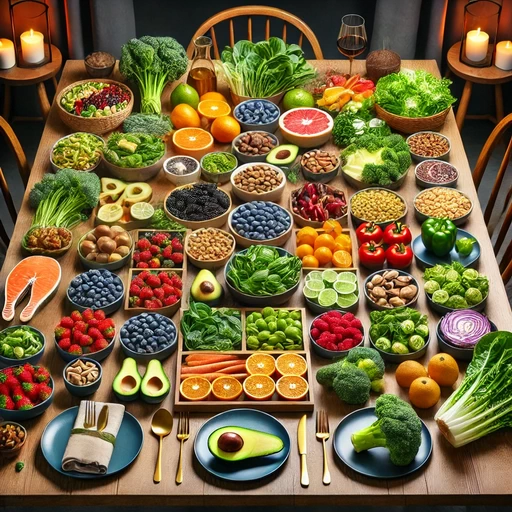
หน้าหลัก | สุขภาพดี | สุภาพสตรี | การแปลผลเลือด | โรคต่างๆ | วัคซีน | อาหารเพื่อสุขภาพ
สุดยอดคู่มืออาหารต้านการอักเสบ: อาหาร ประโยชน์ และแผนมื้ออาหาร
อาหารต้านการอักเสบ: เสริมภูมิต้านทาน สร้างสุขภาพดีจากภายใน
การอักเสบคืออะไร?
การอักเสบเป็นปฏิกิริยาปกติของร่างกายใช้เพื่อป้องกันตัวเองจากอันตรายจากการติดเชื้อ โรค การบาดเจ็บ และสิ่งใดก็ตามที่ร่างกายพิจารณาว่าเป็นอันตราย หลังจากอันตรายถูกกำจัด การอักเสบจะหยุดลงและร่างกายจะมีเวลาในการเยียวยาตัวเอง
แต่หากเกิดการอักเสบเรื้อรัง อาจนำไปสู่โรคต่างๆ เช่น โรคหัวใจ เบาหวาน มะเร็ง และโรคข้ออักเสบ
โชคดีที่เราสามารถดูแลตัวเองและลดการอักเสบได้ด้วยการเลือกรับประทานอาหารที่มีประโยชน์ โดยเฉพาะ
สรุป: การอักเสบเรื้อรังเป็นเหมือน "มากเกินไปในสิ่งที่ดี"
"อาหารต้านการอักเสบ" ซึ่งอุดมไปด้วยสารอาหารที่ช่วยเสริมสร้างระบบภูมิคุ้มกัน ลดความเสี่ยงของโรค และส่งเสริมสุขภาพโดยรวม
กฎง่ายๆ สำหรับการรับประทานอาหารต้านการอักเสบ:
- กินพืชให้มากขึ้น: อาหารจากพืชทั้งหลายมีสารอาหารต้านการอักเสบที่ร่างกายของคุณต้องการ ดังนั้นการรับประทานผักและผลไม้หลากสี ธัญพืชไม่ขัดสี และพืชตระกูลถั่วเป็นจุดเริ่มต้นที่ดีที่สุด
- เน้นสารต้านอนุมูลอิสระ: สารต้านอนุมูลอิสระช่วยป้องกัน ชะลอ หรือซ่อมแซมความเสียหายของเซลล์ และเนื้อเยื่อบางชนิด พบได้ในผักและผลไม้ที่มีสีสัน เช่น เบอร์รี่ ผักใบเขียว บีทรูท และอะโวคาโด รวมถึงถั่วและถั่วเลนทิล ธัญพืชไม่ขัดสี ขิง ขมิ้น และชาเขียว
- รับโอเมก้า 3 ของคุณ: กรดไขมันโอเมก้า 3 มีบทบาทในการควบคุมกระบวนการอักเสบของร่างกาย และอาจช่วยควบคุมความเจ็บปวดที่เกี่ยวข้องกับการอักเสบ พบไขมันที่ดีต่อสุขภาพเหล่านี้ในปลา เช่น ปลาแซลมอน ปลาทูน่า และปลาแมคเคอเรล รวมถึงปริมาณที่น้อยกว่าในวอลนัท พีแคน เมล็ดแฟลกซ์บด และถั่วเหลือง
- กินเนื้อแดงให้น้อยลง: เนื้อแดงอาจทำให้เกิดการอักเสบได้ คุณเป็นคนรักเบอร์เกอร์หรือไม่? ตั้งเป้าหมายที่เป็นจริง ลองแทนที่เนื้อวัวมื้อกลางวันของคุณด้วยปลา ถั่ว หรือโปรตีนจากถั่วเหลืองสองสามครั้งต่อสัปดาห์
- ลดอาหารแปรรูป: ธัญพืชและเครื่องดื่มที่มีน้ำตาล อาหารทอด และขนมอบล้วนเป็นผู้กระทำความผิดที่ก่อให้เกิดการอักเสบได้ พวกมันอาจมีไขมันที่ไม่ดีต่อสุขภาพมากมายที่เชื่อมโยงกับการอักเสบ แต่การรับประทานผักและผลไม้ ธัญพืช และถั่วทั้งหลายอาจทำได้อย่างรวดเร็วหากคุณเตรียมอาหารล่วงหน้าหลายมื้อ

อาหารที่ควรรับประทาน
งานวิจัยชี้ให้เห็นว่าผู้ที่รับประทานผัก ผลไม้ ถั่ว เมล็ดพืช น้ำมันเพื่อสุขภาพ และปลาจำนวนมากมีความเสี่ยงลดลงของโรคที่เกี่ยวข้องกับการอักเสบ สารที่พบในอาหารบางชนิด โดยเฉพาะอย่างยิ่งสารต้านอนุมูลอิสระและกรดไขมันโอเมก้า 3 อาจมีฤทธิ์ต้านการอักเสบ
อาหารที่มีสารต้านอนุมูลอิสระสูง ได้แก่:
- แอปเปิ้ล
- อาร์ติโชก
- อะโวคาโด
- ถั่ว (เช่น ถั่วแดง ถั่วพินโต และถั่วดำ)
- ผลเบอร์รี่ (เช่น บลูเบอร์รี่ ราสเบอร์รี่ และแบล็กเบอร์รี่)
- บรอกโคลี
- เชอร์รี่
- ดาร์กช็อกโกแลต (โกโก้ 70% ขึ้นไป)
- ผักใบเขียวเข้ม (เช่น ผักคะน้า ผักโขม และผักคอลลาร์ด)
- ถั่ว (เช่น วอลนัท อัลมอนด์ พีแคน และเฮเซลนัท)
- มันเทศ
- ธัญพืชไม่ขัดสี
กรดไขมันโอเมก้า 3 เป็น "ไขมันดี" ที่อาจช่วยป้องกันโรคหัวใจ มะเร็ง ข้ออักเสบ และภาวะอื่นๆ อาหารที่มีกรดไขมันโอเมก้า 3 สูง ได้แก่:
- เมล็ดแฟลกซ์
- ปลาที่มีไขมัน (เช่น ปลาแซลมอน ปลาเฮอริ่ง ปลาแมคเคอเรล ปลาซาร์ดีน และปลาแอนโชวี่)
- อาหารเสริมโอเมก้า 3 (รวมถึงไข่และนม)
- วอลนัท
อาหารที่ควรเน้น:
ผักผลไม้หลากสี:;
ยิ่งสีสันสดใส ยิ่งอุดมไปด้วยสารต้านอนุมูลอิสระ ตัวช่วยสำคัญในการลดการอักเสบ
- ผักใบเขียว: เช่น คะน้า ผักโขม บร็อคโคลี
- ผลไม้ตระกูลเบอร์รี่: เช่น บลูเบอร์รี่ สตรอว์เบอร์รี่ ราสเบอร์รี่
- ผลไม้สีเหลือง ส้ม แดง: เช่น ส้ม มะละกอ มะเขือเทศ
- ผักผลไม้หลากสี
ไขมันดี: ช่วยลดการอักเสบและบำรุงหัวใจ
- ปลาทะเลน้ำลึก: เช่น แซลมอน ทูน่า แมคเคอเรล อุดมไปด้วยโอเมก้า 3
- อะโวคาโด: มีไขมันไม่อิ่มตัวเชิงเดี่ยวสูง
- น้ำมันมะกอก: เลือกแบบ extra virgin olive oil
- ถั่วและเมล็ดพืช: เช่น อัลมอนด์ วอลนัท เมล็ดแฟลกซ์
- ปลาทะเลน้ำลึก
ธัญพืชไม่ขัดสี: อุดมไปด้วยใยอาหาร วิตามิน และแร่ธาตุ
- ข้าวกล้อง:
- ขนมปังโฮลวีต:
- ควินัว:
เครื่องเทศและสมุนไพร: มีสารต้านอนุมูลอิสระและสารประกอบที่ช่วยลดการอักเสบ
- ขมิ้นชัน: มีสารเคอร์คูมิน
- ขิง:
- กระเทียม:
นอกจากนี้ยังมีหลักฐานว่าสมุนไพรและเครื่องเทศบางชนิด เช่น ขิง ขมิ้น และกระเทียม สามารถช่วยบรรเทาการอักเสบได้
สรุป: อาหารที่อุดมไปด้วยสารต้านอนุมูลอิสระและกรดไขมันโอเมก้า 3 เป็นกุญแจสำคัญสำหรับอาหารต้านการอักเสบ
อาหารที่อาจจะเป็นสาเหตุที่ทำให้เกิดการอักเสบ
ควรหลีกเลี่ยงอาหารดังต่อไปนี้
- น้ำตาล:
- อาหารแปรรูป:
- ไขมันทรานส์:
- เนื้อแดง:
- แอลกอฮอล์:
- อาหารจีนอาหารแปลงที่ผ่านการขัดสีเช่นขนมปังแป้งต่างๆ
- เฟ้นฟายและอาหารทอด
- โซดาและเครื่องดื่มที่มีน้ำตาล
- เนื้อสีแดงและเนื้อสัตว์ที่ผ่านกระบวนการผลิต
- มาการิน น้ำมันที่ผ่านกระบวนการผลิต และน้ำมันหมู
- อาหารที่มีกรดไขมันโอเมก้า 6 สูงเป็นอาหารที่เพิ่มการอักเสบ
อาหารที่มีกรดไขมันโอเมก้า 6 สูง แม้ว่าไขมันเหล่านี้จะมีความสำคัญต่อสุขภาพกระดูก การทำงานของสมอง และการเผาผลาญ (การเปลี่ยนอาหารเป็นพลังงาน) การบริโภคกรดไขมันโอเมก้า 6 มากเกินไปสามารถเพิ่มการอักเสบได้
อาหารที่มีกรดไขมันโอเมก้า 6 สูง ได้แก่:
- ผลิตภัณฑ์นม (เช่น นม ชีส เนย และไอศกรีม)
- มาการีน
- เนื้อสัตว์
- ถั่วลิสง
- น้ำมันพืช (เช่น น้ำมันข้าวโพด น้ำมันดอกคำฝอย น้ำมันถั่วเหลือง น้ำมันถั่วลิสง และน้ำมันเมล็ดฝ้าย)
เพื่อให้การอักเสบอยู่ภายใต้การควบคุม สิ่งสำคัญคือต้องรักษาสมดุลกรดไขมันโอเมก้า 6 กับกรดไขมันโอเมก้า 3 ของคุณ
-
อาหารที่มีดัชนีน้ำตาลสูง (GI) ยังสามารถเพิ่มการอักเสบได้ เหล่านี้คืออาหารเช่นน้ำตาลและธัญพืชขัดสีที่เพิ่มระดับกลูโคสในเลือด (น้ำตาล) ของคุณมากเกินไปและเร็วเกินไป
เพื่อช่วยควบคุมการอักเสบ ให้หลีกเลี่ยงเครื่องดื่มที่มีน้ำตาล ขนมปังขาว ของหวาน และอาหารแปรรูป ให้รับประทานอาหารที่มี GI ต่ำ เช่น ไก่ ธัญพืชไม่ขัดสี ผักใบเขียว และผักที่ไม่ใช่แป้งแทน
สรุป: เพื่อช่วยลดการอักเสบ ให้จำกัดปริมาณอาหารที่คุณรับประทานที่มีกรดไขมันโอเมก้า 6
อาหารดังกล่าวมีความเชื่อมโยงกับความเสี่ยงในการเกิดโรคเบาหวานชนิดที่2 โรคหัวใจ และโรคที่ทำให้เกิดการอักเสบนอกจากนี้อาหารดังกล่าวยังทำให้เกิดมะเร็งเคล็ดลับเพิ่มเติม:
- ดื่มน้ำสะอาดให้เพียงพอ:
- ออกกำลังกายสม่ำเสมอ:
- นอนหลับพักผ่อนให้เพียงพอ:
- จัดการความเครียด:
การเลือกรับประทานอาหารต้านการอักเสบเป็นอีกหนึ่งก้าวสำคัญในการดูแลสุขภาพ เริ่มต้นปรับเปลี่ยนพฤติกรรมการกินตั้งแต่วันนี้ เพื่อสุขภาพที่ดีในระยะยาว
หมายเหตุ: บทความนี้มีวัตถุประสงค์เพื่อให้ข้อมูลความรู้ทั่วไปเท่านั้น ไม่สามารถใช้แทนคำแนะนำจากแพทย์หรือนักโภชนาการได้ หากมีข้อสงสัยเกี่ยวกับสุขภาพ ควรปรึกษาผู้เชี่ยวชาญ
ความเครียดจากการอักเสบอย่างต่อเนื่องสามารถนำไปสู่การเปลี่ยนแปลงในร่างกายที่นำไปสู่การพัฒนาของโรคหัวใจ ข้ออักเสบ มะเร็ง และโรคอื่นๆ ที่เกี่ยวข้องกับความชรา
การอักเสบ (Inflammation) เป็นกระบวนการทางธรรมชาติที่ร่างกาย เช่น เชื้อโรค บาดแผล หรือสารพิษต่างๆ
วิธีที่ดีที่สุดที่จะลดการอักเสบไม่ใช่ยาแต่อยู่ในตู้เย็นอาหารหลายประเภทสามารถลดการอักเสบได้ ระบบภูมิคุ้มกันของร่างกายจะมีหน้าจีต่อสู้กับเชื้อแบคทีเรีย เกษรดอกไม้ หรือสารเคมีที่เข้าสู่ร่างกาย เมื่อสารเหล่านี้เข้าสู่ร่างกายก็จะกระตุ้นให้ร่างกายสร้างภูมิ และเกิดกระบวนการที่เรียกว่าการอักเสบการอักเสบเป็นสิ่งที่ดีหากเกิดช่วงสั้นสั้น สำหรับต่อสู้กับสิ่งแปลกปลอมแต่บางครั้งการอักเสบนั้นเรื้อรังเป็นระยะเวลานานการอักเสบนั้นก็จะเป็นผล เสียต่อร่างกายทำให้เกิดโรคหลายโรค เช่นมะเร็งโรค หัวใจ เบาหวาน ข้ออักเสบ ซึมเศร้า โรคสมองเสื่อม ซึ่งโรคดังกล่าวจะมีความเชื่อมโยงกับการอักเสบเรื้อรัง
วิธีที่ดีที่สุดในการจัดการเกิดอะจัดการกับการอักเสบมิใช่เกิดจากการรับประทานยา แต่เกิดจากการรับประทานอาหาร
ภาวะสุขภาพต่อไปนี้เกี่ยวข้องกับการอักเสบ:
- โรคข้ออักเสบรูมาตอยด์
- โรคสะเก็ดเงิน
- โรคหอบหืด
- โรคหลอดอาหารอักเสบจากอีโอซิโนฟิล
- โรคโครห์น
- โรคลำไส้ใหญ่
- โรคลำไส้อักเสบ
- โรคลูปัส
- โรคไทรอยด์ฮาชิโมโตะ
- กลุ่มอาการเมตาบอลิก
กลุ่มอาการเมตาบอลิกหมายถึงกลุ่มของภาวะที่มักเกิดขึ้นร่วมกัน ได้แก่ โรคเบาหวานชนิดที่ 2 โรคอ้วน ความดันโลหิตสูง และโรคหัวใจและหลอดเลือด
นักวิทยาศาสตร์เชื่อว่าการอักเสบมีบทบาทในภาวะเหล่านี้ทั้งหมด ดังนั้น อาหารต้านการอักเสบจึงอาจช่วยปรับปรุงสุขภาพของผู้ที่มีกลุ่มอาการเมตาบอลิกได้
การรับประทานอาหารที่อุดมไปด้วยสารต้านอนุมูลอิสระอาจช่วยลดความเสี่ยงของมะเร็งบางชนิดได้
สารต้านอนุมูลอิสระช่วยกำจัดอนุมูลอิสระ แต่ อนุมูลอิสระคืออะไร?
มีเหตุผลหลายประการที่ทำให้คนๆ หนึ่งอาจมีอาการอักเสบเรื้อรัง ตัวอย่างหนึ่งคือโรคอ้วน ซึ่งเนื้อเยื่อไขมันส่วนเกินทำให้เกิดการเปลี่ยนแปลงของฮอร์โมนและระบบภูมิคุ้มกันที่สร้างการอักเสบที่ส่งผลกระทบต่อทั้งร่างกาย
สาเหตุอื่นๆ ของการอักเสบเรื้อรัง ได้แก่:
- การสูบบุหรี่
- การดื่มสุราในทางที่ผิด
- การติดเชื้อเรื้อรัง เช่น HIV หรือไวรัสตับอักเสบ B
- โรคภูมิต้านตนเอง เช่น โรคลูปัสและโรคข้ออักเสบรูมาตอยด์
- การสัมผัสสารพิษอย่างต่อเนื่อง เช่น สารเคมีอุตสาหกรรม
- ความเครียดเรื้อรัง
เมื่อเวลาผ่านไป การอักเสบเรื้อรังสามารถเพิ่มความเสี่ยงของโรคต่างๆ เช่น โรคหัวใจ เบาหวาน มะเร็ง ข้ออักเสบ และโรคปอดอุดกั้นเรื้อรัง (COPD) แม้ว่าโรคเหล่านี้สามารถเกิดขึ้นได้โดยไม่มีการอักเสบเรื้อรัง แต่การอักเสบเรื้อรังรุนแรงสามารถทำให้โรคเหล่านี้พัฒนาเร็วกว่าที่คาดไว้ 10 ปีหรือมากกว่านั้น
อาหาร 15 อย่างต่อไปนี้มีคุณค่าทางโภชนาการสูงและเหมาะอย่างยิ่งสำหรับอาหารต้านการอักเสบ:
-
อัลมอนด์: อัลมอนด์เป็นแหล่งที่ดีของไขมันไม่อิ่มตัวเชิงเดี่ยว (คล้ายกับน้ำมันมะกอก) วิตามินอี และแมงกานีส นอกจากนี้ยังเป็นแหล่งที่ดีของแมกนีเซียมและโปรตีนจากพืช งานวิจัยแสดงให้เห็นว่าการรับประทานอัลมอนด์สัมพันธ์กับความเสี่ยงที่ลดลงของโรคหัวใจและหลอดเลือด ซึ่งอาจเป็นเพราะช่วยปรับปรุงไขมันในเลือด อัลมอนด์ยังทำให้อิ่มท้อง ดังนั้นแม้ว่าจะมีแคลอรี่สูงกว่าอาหารต้านการอักเสบอื่นๆ การรับประทานอัลมอนด์หนึ่งกำมืออาจช่วยให้คุณทำตามแผนการลดน้ำหนักเพื่อสุขภาพได้
-
อะโวคาโด: อะโวคาโดอุดมไปด้วยไขมันไม่อิ่มตัวเชิงเดี่ยวที่ดีต่อสุขภาพหัวใจ นอกจากนี้ยังเป็นแหล่งที่ดีของแมกนีเซียม ไฟเบอร์ และโพแทสเซียม ในขณะที่มีโซเดียมต่ำ การรับประทานอะโวคาโดครึ่งลูกจะช่วยเพิ่มปริมาณวิตามินซี เอ อี และวิตามินบีรวมที่คุณได้รับในแต่ละวัน การผสมผสานสารอาหารเหล่านี้และโพลีฟีนอลที่ทำหน้าที่เป็นสารต้านอนุมูลอิสระทำให้อะโวคาโดเป็นสิ่งที่ต้องมีสำหรับอาหารต้านการอักเสบ เพิ่มอะโวคาโดหั่นบางๆ ลงในแซนวิชหรือสลัดที่คุณชื่นชอบ หรือทำกัวคาโมเล่แสนอร่อย
-
บรอกโคลี: บรอกโคลีเป็นสมาชิกของผักตระกูลกะหล่ำ ซึ่งมีสารเคมีจากพืชที่เรียกว่ากลูโคซิโนเลตในปริมาณสูง สารเคมีจากพืชเหล่านี้เป็นสารต้านอนุมูลอิสระที่มีประสิทธิภาพ บรอกโคลียังเป็นแหล่งที่ดีของวิตามินซี โพแทสเซียม แคลเซียม และวิตามินเอ ทั้งหมดนี้ในขณะที่มีแคลอรี่ต่ำ การเพิ่มบรอกโคลีในอาหารของคุณทำได้ง่ายเพราะอร่อยทั้งแบบสุกและดิบ การศึกษาทางระบาดวิทยาแสดงให้เห็นว่าการรับประทานอาหารที่มีผักตระกูลกะหล่ำรวมถึงบรอกโคลีในปริมาณสูงสัมพันธ์กับความเสี่ยงที่ลดลงของมะเร็งบางชนิด
-
บลูเบอร์รี่: บลูเบอร์รี่มีโพลีฟีนอลในปริมาณมาก ซึ่งกระตุ้นกิจกรรมต้านอนุมูลอิสระและอาจช่วยป้องกันมะเร็งและโรคหัวใจและหลอดเลือด สารเคมีจากพืชเหล่านี้รวมถึงฟลาโวนอยด์ แอนโธไซยานิน กรดฟีนอล และแทนนิน ป้องกันและซ่อมแซมความเสียหายของเซลล์ที่เกิดจากอนุมูลอิสระ การศึกษาในห้องปฏิบัติการแสดงให้เห็นว่าสารเคมีในบลูเบอร์รี่อาจป้องกันมะเร็งได้โดยการชะลอการเจริญเติบโตของเซลล์และลดการอักเสบ นอกจากนี้ยังมีแคลอรี่ต่ำและเพิ่มวิตามินซี วิตามินอี และไฟเบอร์ให้กับอาหารประจำวันของคุณ และอย่าลืมว่ามันอร่อยมาก!
-
แครอท: แครอทมีเบต้าแคโรทีน ซึ่งร่างกายของคุณสามารถเปลี่ยนเป็นวิตามินเอ ซึ่งจำเป็นต่อสุขภาพของคุณ แต่มันก็เป็นสารต้านอนุมูลอิสระที่มีประสิทธิภาพในตัวเอง แครอทยังมีซีแซนทีนและลูทีน ซึ่งเกี่ยวข้องกับวิตามินเอ การรับประทานอาหารที่อุดมไปด้วยสารต้านอนุมูลอิสระเหล่านี้อาจช่วยลดความเสี่ยงของมะเร็งได้โดยการป้องกันความเสียหายต่อเซลล์ที่แข็งแรงในร่างกายของคุณ เนื่องจากแครอทมีแคลอรี่ต่ำและเป็นแหล่งที่ดีของไฟเบอร์ จึงสามารถช่วยลดน้ำหนักได้หากจำเป็น ซึ่งสำคัญเพราะโรคอ้วนเป็นปัจจัยเสี่ยงของโรคหัวใจและหลอดเลือด เบาหวาน และมะเร็งบางรูปแบบ
-
ถั่วแห้ง: ถั่วแห้ง เช่น ถั่วขาว ถั่วแดง ถั่วพินโต และถั่วดำ เป็นแหล่งต้านการอักเสบที่ดีของโปรตีนจากพืช แร่ธาตุ วิตามินบีรวม และวิตามินเค นอกจากนี้ยังมีไฟเบอร์ที่เป็นประโยชน์มากมาย และมีโพลีฟีนอลที่ทำหน้าที่เป็นสารต้านอนุมูลอิสระ เนื่องจากถั่วมีโปรตีนสูง จึงเหมาะสำหรับอาหารมังสวิรัติที่คุณจะต้องหลงรักแม้ว่าคุณจะไม่ใช่มังสวิรัติ งานวิจัยชี้ให้เห็นว่าถั่วแห้งอาจให้ประโยชน์ต่อสุขภาพและช่วยป้องกันโรคหัวใจ เบาหวาน ความดันโลหิตสูงบางชนิด รวมถึงลดการอักเสบ
-
ผักคะน้า: ผักคะน้าเป็นแหล่งที่ดีของวิตามินเอ ซี และเค และเป็นแหล่งที่ดีของแคลเซียม เหล็ก แมกนีเซียม โพแทสเซียม และวิตามินซี ในขณะที่มีโซเดียมต่ำ นอกจากนี้ยังมีแคลอรี่ต่ำและมีไฟเบอร์เล็กน้อย ผักคะน้ามีสารประกอบที่เรียกว่ากลูโคซิโนเลต ซึ่งอาจช่วยป้องกันมะเร็ง รวมถึงลูทีนและซีแซนทีน ซึ่งเกี่ยวข้องกับวิตามินเอและอาจช่วยลดความเสี่ยงของการเกิดต้อกระจกและความเสื่อมของจุดภาพ นอกจากนี้ ลูทีนอาจช่วยป้องกันภาวะหลอดเลือดแดงแข็ง เพิ่มผักคะน้าลงในสลัดหรือกินมันฝรั่งทอดกรอบเป็นอาหารว่าง
-
น้ำมันมะกอก: น้ำมันมะกอกเป็นส่วนประกอบสำคัญของอาหารเมดิเตอร์เรเนียน ซึ่งเชื่อมโยงกับสุขภาพหัวใจและอายุยืนยาว อุดมไปด้วยไขมันไม่อิ่มตัวเชิงเดี่ยวที่ดีสำหรับหลอดเลือดของคุณ และมีโพลีฟีนอลที่ทำหน้าที่เป็นสารต้านอนุมูลอิสระเพื่อปกป้องเซลล์ในร่างกายของคุณ น้ำมันมะกอกช่วยลดการอักเสบ ลดคอเลสเตอรอลสูง และเป็นไปได้ว่าโพลีฟีนอลบางชนิดอาจช่วยป้องกันมะเร็งบางรูปแบบ ดังนั้นจึงเป็นน้ำมันที่วิเศษที่จะเพิ่มเข้าไปในครัวของคุณ ไม่ได้ดีที่สุดเสมอไปสำหรับการปรุงอาหาร แต่มันเหมาะสำหรับน้ำสลัดและสำหรับปิดท้ายอาหารจานผัก
-
ส้ม: ส้มเป็นแหล่งที่ดีของวิตามินซีและโพแทสเซียม และยังมีไฟเบอร์ แคลเซียม และโฟเลต ไฟเบอร์และโฟเลตในส้มอาจช่วยให้หัวใจของคุณแข็งแรง และวิตามินซีจำเป็นต่อการทำงานของระบบภูมิคุ้มกัน เนื้อเยื่อเกี่ยวพันที่แข็งแรง และหลอดเลือดที่แข็งแรง ส้มและน้ำส้มเป็นส่วนเสริมที่ดีเยี่ยมสำหรับอาหารต้านการอักเสบ และคุณไม่จำเป็นต้องเก็บไว้สำหรับอาหารเช้า ส้มเป็นอาหารว่างยามบ่ายที่ดีและสามารถเพิ่มลงในอาหารและสลัดได้หลากหลาย
-
ปลาแซลมอน: ปลาแซลมอนมีกรดไขมันโอเมก้า 3 ในปริมาณมาก ซึ่งมากกว่าปลาหรืออาหารทะเลชนิดอื่นๆ การศึกษาชี้ให้เห็นว่าผู้ที่มีปริมาณกรดไขมันเหล่านี้สูงกว่าอาจมีโอกาสน้อยที่จะทนทุกข์ทรมานจากตาแห้ง และยังดีต่อหัวใจเพราะไขมันที่ดีต่อสุขภาพช่วยลดการอักเสบและควบคุมคอเลสเตอรอล สมาคมโรคหัวใจอเมริกันแนะนำให้คุณกินปลาที่มีไขมันอย่างน้อยสัปดาห์ละสองครั้งเพราะโอเมก้า 3 ที่มีประโยชน์ แต่สิ่งที่ทำให้ปลาแซลมอนดียิ่งขึ้นคือมันยังเป็นแหล่งที่ดีของสารต้านอนุมูลอิสระที่เรียกว่าแอสตาแซนธิน
-
ผักโขม: ผักโขมเป็นหนึ่งในสุดยอดอาหารต้านการอักเสบที่เป็นที่รู้จักกันดีที่สุด ประกอบด้วยลูทีน ซึ่งเกี่ยวข้องกับวิตามินเอและเบต้าแคโรทีน ผักโขมยังให้ธาตุเหล็ก วิตามินเค และโฟเลต และมีแคลอรี่ต่ำมาก ดังนั้นจึงเหมาะสำหรับอาหารลดน้ำหนัก งานวิจัยแสดงให้เห็นว่าผู้ที่รับประทานผักใบเขียว เช่น ผักโขม อาจมีความเสี่ยงลดลงของความเสื่อมของจุดภาพ ดังนั้นเพิ่มผักโขมสดหรือปรุงสุกในอาหารของคุณให้มาก
-
สตรอเบอร์รี่: สตรอเบอร์รี่อร่อย ชุ่มฉ่ำ และหวาน และที่ดียิ่งกว่านั้นคือดีต่อสุขภาพของคุณ สตรอเบอร์รี่มีแคลอรี่ต่ำ มีไฟเบอร์สูง และมีวิตามินและแร่ธาตุที่ร่างกายต้องการเพื่อให้ทำงานได้ตามปกติ รวมทั้งวิตามินซีจำนวนมาก นอกจากนี้ยังมีคุณสมบัติต้านการอักเสบและประโยชน์ต่อสุขภาพมากมาย เม็ดสีที่ทำให้ผลเบอร์รี่มีสีสันนั้นมีสารต้านอนุมูล
การเพิ่มอาหารอร่อยและดีต่อสุขภาพเหล่านี้อาจช่วยปรับปรุงสุขภาพโดยรวมของคุณและทำให้การควบคุมน้ำหนักให้อยู่ในเกณฑ์ที่เหมาะสมง่ายขึ้น อาหารที่อุดมไปด้วยอาหารต้านการอักเสบยังอาจช่วยป้องกันการเกิดภาวะสุขภาพบางอย่างเมื่อคุณอายุมากขึ้น เพียงให้แน่ใจว่าอาหารต้านการอักเสบของคุณมีประโยชน์ต่อสุขภาพโดยใช้วิธีการปรุงอาหารและการเตรียมอาหารที่ดีที่สุด
วิธีใช้ อาหาร ช่วยให้ร่างกายต่อสู้กับการอักเสบ
คุณกินอะไร คุณก็เป็นอย่างนั้น ใช่ไหม? แต่นั่นหมายความว่าอย่างไร? เรียนรู้ว่าอาหารของคุณส่งผลต่อการอักเสบในร่างกายอย่างไร และนั่นหมายถึงอะไรต่อสุขภาพของคุณ
คำว่า "อาหารต้านการอักเสบ" ถูกพูดถึงกันมากในการสนทนาเรื่องโภชนาการในปัจจุบัน แต่ทำไมการอักเสบถึงไม่ดีต่อเรากันนะ? แล้วอาหารเกี่ยวอะไรกับมัน?
การอักเสบเป็นส่วนหนึ่งของการตอบสนองปกติของร่างกายต่อการติดเชื้อหรือการบาดเจ็บ เป็นช่วงที่เนื้อเยื่อที่เสียหายของคุณปล่อยสารเคมีที่บอกให้เซลล์เม็ดเลือดขาวเริ่มซ่อมแซม แต่บางครั้ง การอักเสบก็อยู่ในระดับต่ำ กระจายไปทั่วร่างกาย และเรื้อรัง
การอักเสบเรื้อรังนี้สามารถทำลายร่างกายของคุณได้ มันสามารถมีบทบาทในการสะสมของคราบพลัคในหลอดเลือดแดงของคุณ ซึ่งสามารถเพิ่มความเสี่ยงต่อโรคหัวใจและโรคหลอดเลือดสมองได้ นอกจากนี้ยังเกี่ยวข้องกับความเสี่ยงที่สูงขึ้นของมะเร็ง เบาหวาน และภาวะเรื้อรังอื่นๆ
อาหารของคุณช่วยหรือทำร้ายได้อย่างไร
ทางเลือกที่คุณทำที่ร้านขายของชำอาจส่งผลต่อการอักเสบในร่างกายของคุณ นักวิทยาศาสตร์ยังคงไขปริศนาว่าอาหารส่งผลต่อกระบวนการอักเสบของร่างกายอย่างไร แต่พวกเขารู้บางสิ่ง
งานวิจัยแสดงให้เห็นว่าสิ่งที่คุณกินสามารถส่งผลต่อระดับของโปรตีน C-reactive (CRP) ซึ่งเป็นเครื่องหมายของการอักเสบในเลือดของคุณ นั่นอาจเป็นเพราะอาหารบางชนิด เช่น น้ำตาลแปรรูป ช่วยปล่อยสารสื่อสารการอักเสบที่สามารถเพิ่มความเสี่ยงของการอักเสบเรื้อรังได้ อาหารอื่นๆ เช่น ผักและผลไม้ ช่วยให้ร่างกายของคุณต่อสู้กับภาวะเครียดจากปฏิกิริยาออกซิเดชั่น ซึ่งสามารถกระตุ้นการอักเสบได้
ข่าวดี: อาหารที่เป็นต้านการอักเสบมักจะเป็นอาหารชนิดเดียวกับที่สามารถช่วยให้คุณมีสุขภาพดีในด้านอื่นๆ ได้เช่นกัน ดังนั้นการรับประทานอาหารโดยคำนึงถึงการอักเสบจึงไม่จำเป็นต้องซับซ้อนหรือจำกัด
https://www.mayoclinic.org/healthy-lifestyle/nutrition-and-healthy-eating/in-depth/how-to-use-food-to-help-your-body-fight-inflammation/art-20457586
https://www.healthline.com/nutrition/6-foods-that-cause-inflammation
https://www.healthline.com/nutrition/20-foods-to-avoid-like-the-plague
https://health.clevelandclinic.org/5-foods-that-can-cause-inflammation/
https://www.foodnetwork.ca/healthy-eating/photos/most-inflammatory-foods/#!inflammation-crackers
https://www.health.harvard.edu/staying-healthy/foods-that-fight-inflammation?utm_content=buffer9c826&utm_medium=social&utm_source=twitter&utm_campaign=buffer
